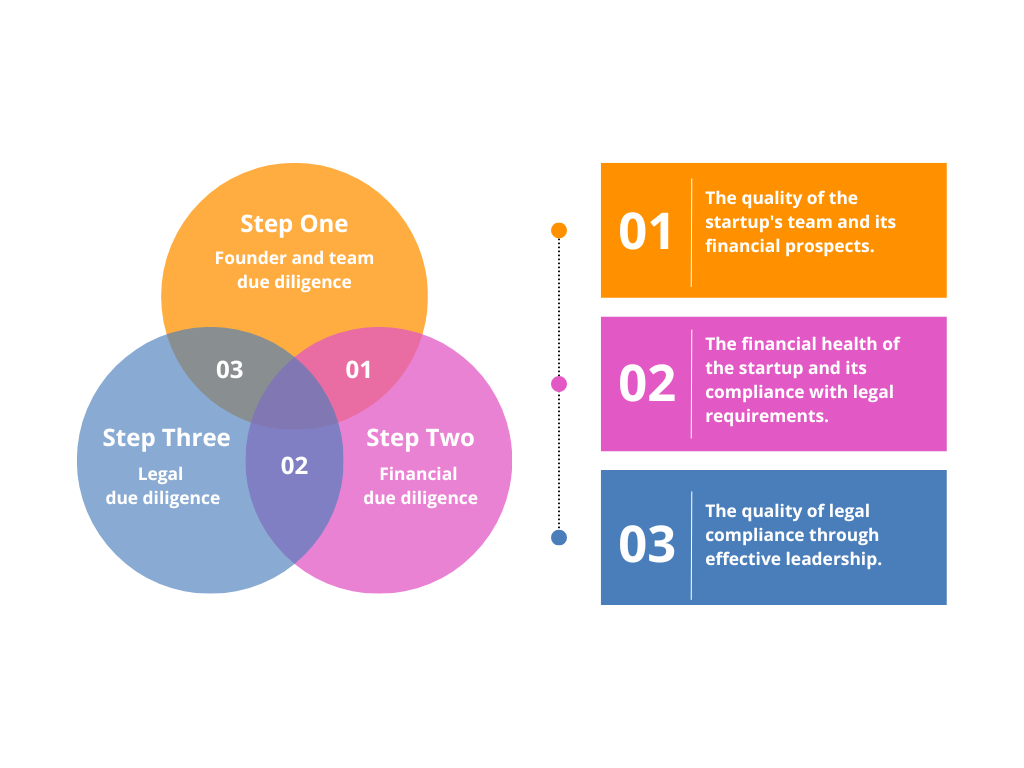Investing in startups can be a rewarding endeavour, but it also carries significant risks. It is essential to conduct thorough due diligence to minimise these risks and increase your chances of success. In this article, we will examine the relationship between founder and team due diligence, financial due diligence, and legal compliance. Additionally, we will provide guidance on performing a comprehensive evaluation of start-ups.
Understanding the Three Pillars of Due Diligence
Founder and Team Due Diligence
The success of a startup largely depends on the skills and vision of its founders and team. Therefore, it is crucial to seek out teams with a proven track record, complementary skills, and the ability to adapt to changes or pivot when necessary. You should evaluate their leadership qualities, experience, and commitment to the venture.

While some investors may rely on gut feeling to determine investor-founder fit, the most effective way to evaluate the founders and team with due diligence is to understand their leadership skills, vision, and ambitions. The best way to do this is by conducting a structured due diligence process that evaluates the founder's and team's resilience and perseverance, growth skills, and leadership capabilities, measured against your priorities.
Financial Due Diligence
The financial health of a startup is crucial for its sustainability and growth. 'Glass-bowl esoteric' forecasts lack the precision essential for strategic planning, budgeting, and projections. In addition, overly optimistic forecasts are a common cause for start-ups to run out of cashflow.

Therefore, analyse the revenue model, financial projections, cost structure, and funding requirements, and encourage them to use a cutting-edge management tool that ensures the accuracy of their financial data in real time. These tools ensure that the financials are realistic and achievable and assess the start-up's ability to generate revenue and achieve profitability.
Legal Due Diligence
Legal due diligence is a necessary process that ensures that a startup operates within the legal framework, avoiding costly legal issues. A thorough understanding of the startup's legal obligations is essential for effective legal compliance. It includes assessing compliance with financial regulations, intellectual property rights, and employment laws.
Moreover, it is vital to have a robust corporate governance structure in place, which includes strict cybersecurity measures and a culture of privacy. Compliance not only builds trust with investors and customers but also mitigates legal risks and cyber threats.
The Crucial Intersections of the Three Pillars of Due Diligence
The diagram illustrates the intricate balance between startup success and due diligence. The intersections uncover the secrets to start-up longevity, from the synergy of a talented team to the balancing act of financial growth and legal compliance.

Intersection One, as shown in the diagram, is a crucial connection between a startup's team quality and its financial prospects. The collaboration between a proficient team and a robust financial strategy is a potent indicator of a startup's potential for success. It emphasises how a competent team can stimulate financial growth and adeptly overcome challenges. Ultimately, a top-notch startup team significantly contributes to the startup's long-term financial health and sustainability.
Intersection Two exemplifies how startups strive to maintain a balance between financial growth and legal compliance. It underscores the significance of aligning the startup's financial practices, such as revenue generation, cost management, and funding strategies, with relevant laws and regulations. This ensures sustainable and ethical business practices while also ensuring business continuity.
Intersection Three refers to how a startup's legal compliance and leadership qualities intersect. This intersection emphasises the significance of a capable and ethical leadership team prioritising legal compliance. A strong leadership team can effectively navigate legal complexities, ensure compliance with regulations, and uphold the company's integrity. Above all, it highlights the importance of founders and team members having a deep understanding of legal obligations, prioritising ethical behaviour, and establishing a culture of compliance within the startup.
Preparing for investment success
Investing in startups requires a thorough understanding of the interconnection between founder and team due diligence, financial due diligence, and legal compliance. By conducting a comprehensive evaluation of start-ups, investors can mitigate risks and maximise their chances of success. Remember to consider the holistic nature of due diligence and the importance of each aspect in assessing a startup’s potential for success.
Elevate your startup success with due diligence now.


